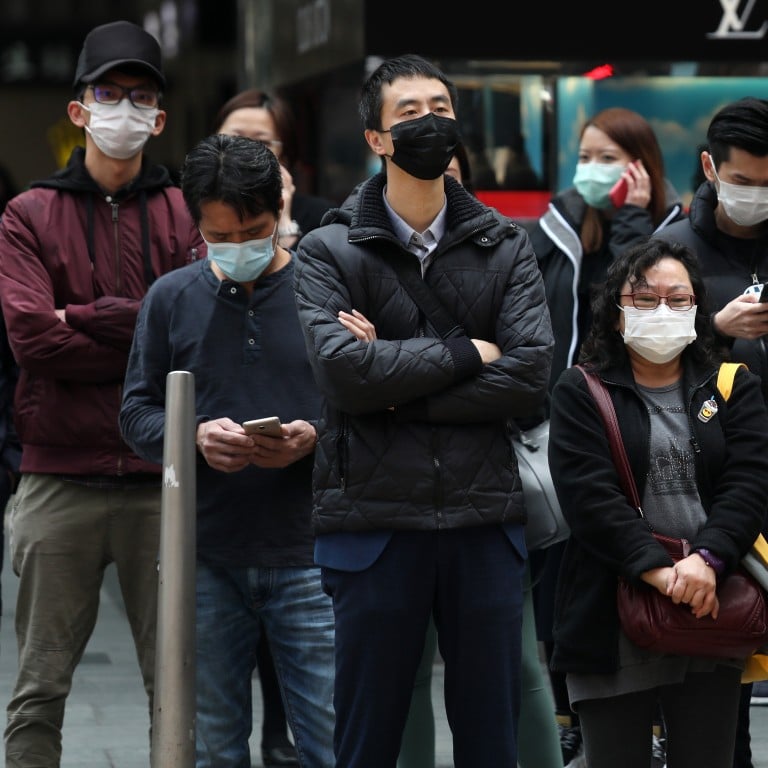
Worse than financial crisis, deadlier than Sars: coronavirus to push Hong Kong bankruptcies to decade high
- The trade war, social unrest and coronavirus outbreak will make it harder for individuals and companies to stay afloat this year, says Johnson Kong of HKICPA
- In 2019, personal bankruptcies in Hong Kong rose 9 per cent year on year to 8,151, while company winding-up petitions jumped 14 per cent to 419
Hong Kong is poised to see the biggest jump in more than a decade in personal bankruptcies and companies winding up this year, as individuals and firms are overwhelmed by “multiple problems” that are far worse than any crisis seen previously, according to the Hong Kong Institute of Certified Public Accountants.
“I expect the situation will be worse than previous crises such as Sars (Severe Acute Respiratory Syndrome) in 2003 because we are facing multiple problems which have been dragging on for more than a year, ranging from the US-China trade war, social unrest and now the coronavirus outbreak,” Johnson Kong Chi-how, the new president of HKICPA, which represents more than 45,000 accountants.
“We have seen a lot of potential restructuring and liquidation inquiries from many companies since last year as the US-China trade war and the social unrest have hit hard the local and mainland economies,” Kong said in a telephone interview last week.
In 2019, personal bankruptcies in Hong Kong rose 9 per cent year on year to 8,151, while company winding-up petitions jumped 14 per cent to 419, according to data from the government’s Official Receiver’s Office.

The sharp rise in company collapses will push the unemployment rate higher than the 3.4 per cent for the three months to the end of January, already up from 2.8 per cent in the year-earlier period. The unemployment rate during Sars was 8 per cent.
Analysts said this was worrying because unlike many countries such as the US and Europe that have comprehensive unemployment benefits, Hong Kong hardly has any protection for jobless people. This will further cut down local consumption while banks may face higher levels of bad debt.
Hong Kong accountants’ body asks stock exchange to delay deadline for filing annual results
The increases last year were already the highest annual jump in both categories since 2009, when bankruptcy petitions jumped 36 per cent to 15,784, while company winding-up rose 22 per cent to 759. Kong expects these numbers to soar further.
The Sars epidemic in 2003 saw company winding-up petitions rise 1.4 per cent from 2002 to a record 1,451. Personal bankruptcies, however, fell 18 per cent to 22,092, compared to an all-time high of 26,922 in 2002.
Kong, who is the managing director of accounting firm BDO and a liquidation veteran, said some winding-up hearings have been postponed because of the ongoing Covid-19 outbreak, which is rapidly growing into a global epidemic with cases of infections in some three dozen countries.
Chinese authorities in a bid to contain the outbreak have imposed a total lock down in Wuhan, where the virus originated and many cities in Hubei province for a month now, while many countries have imposed travel restriction to China and imposed a ban on tourists from the mainland. Workers have only recently started returning to factories and offices after an extended Lunar New Year holiday. Meanwhile, auditors from Hong Kong are unable to go north to conduct audits of the more than 1,200 mainland companies listed in the city.
The HKICPA president said the guideline was not clear enough and would like to see the exchange provide additional guidance on what information, which is considered as sufficient, should be issued.
“The travel bans have a huge impact on the capital market in Hong Kong as it means many initial public offerings may be delayed, while mergers and acquisitions will also be postponed as auditors could not conduct their work,” Kong said.
Derek Lai Kar-yan, vice-chairman of Deloitte China, who is also a veteran liquidation expert, said the travel ban has made it more difficult for companies in financial trouble to find white knights.
“We have seen many companies, particularly in the food and beverage and retail sectors, ask for debt restructuring since the beginning of last year. Some white knights are interested in rescuing these companies, but the recent travel ban has meant that due diligence has been put on hold,” Lai said.

